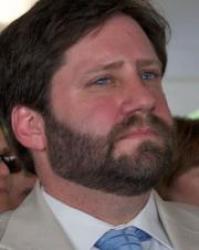On a beautiful, cool August 2014 evening, Claudia Emerson read from her forthcoming collection of poetry at the inaugural VQR Writers’ Conference. She was between treatments for the cancer that ultimately took her life. Claudia was that night what she always was in our interactions: smart, radiant, rich in language. I knew her for less than a decade but, like so many others, felt a closeness because she allowed it with characteristic openness. The poet and the person were one.
A Virginia native who graduated from the University of Virginia and published numerous poems in the pages of this magazine, Claudia wrote as both a natural and a naturalist. In our fall 2008 issue, she published “The Polio Vaccine, Chatham, Virginia, 1964,” which is narrated by an elementary-school child about, one assumes, a stricken classmate:
It was not death we came to fear but her life,
her other birth, waking remade from the womb
of that disease.
The poem concludes with the children lined up outside the school to receive their vaccination in the form of “sugar cubes rose-pink / with the livid virus tamed, its own undoing.”
We opened our mouths, held it on our tongues
and, as with any candy, savored the sharp corners
going, the edges, until at last the form gave way
to grain, to sweet sand washing against the salt of us.
Beyond the storytelling itself, there is much technical skill to be praised here. Consider, for example, how medicine produced in a factory takes on the marker of the natural world—“rose-pink”—while the truly natural phenomena, the virus, is personified as “livid.” The story could be told in any number of ways, but the carved turn of each line can only be as she divided it. The alliterative sounds fall perfectly against one another, just close enough to register: savored, sharp, going, grain, sand, salt.
Though she received the 2006 Pulitzer Prize for a collection of deeply personal poems, one of Claudia’s finest gifts was for inhabiting the voices of others, creating essentially a Spoon River Anthology for rural Virginia. She dwelled on the beauties of the mundane world. She did not, however, romance the life. She was a realist, as any naturalist must be. And in her poems, one organism is always being valued above another: the human over the virus, the chicken over the sparrow.
In “House Sparrows,” the reader thinks initially that the female narrator could be the poet herself speaking of her town overrun with the ubiquitous birds that roost briefly even “in letters / at the pharmacy, cursive, neon serifs.” But, within a few more lines, we find the narrator to be much harder in her disposition. Disliking her nieces and nephews “in equal measure,” she instructs them to knock down the bird nests and throw the unhatched eggs (“warped marbles”) against the barn “where they explode into a constellation / of watery stars.” And the poor hatchlings? They are tossed into the chicken yard. Brutal, yes. But true to farm life, where chicken feed is for the chickens alone, not the random birds of the air. After feasting on this “rarest meat,” the chickens will soon go back to maintaining their lot as “grassless as a cemetery swept clean of grief.” Nature, red in tooth and claw, from a poet who knows whereof she speaks.
Right now, so many of us cannot imagine one particular cemetery being swept clean of its grief. Our minds turn to Claudia and her beloved husband, the musician Kent Ippolito. They shared an understanding that the bond between poetry and song is ancient and unbreakable. Beneath the surface of Claudia’s poems, the structure shows how essential songs were to her creative process. Timing, rhythm; flow, meter; pacing, narration; whatever terms one wishes to deploy, the relationship of song to her poetry is distinct.
As with her affinity for song, Claudia knew about love, too, and wrote of it with such care that one cannot help but see that she wrote from the vantage point of personal experience. It has been noted by literary critics how often she wrote poems about loss. I respectfully disagree: Claudia Emerson wrote of memory, not loss; of faith, not loss; of decay and disease, not loss; of the journey, not loss. And she is not, now, lost to us either.
Claudia Emerson poems in VQR
“Piano Fire” (Summer 2006)
“Anorexic, Farmers’ Market” (Summer 2006)
“The Medical Venus” (Fall 2008)
“Spring Ice Storm” (Fall 2008)
“The Polio Vaccine, Chatham, Virginia, 1964” (Fall 2008)
“House Sparrows” (Spring 2012)
“Greengrocer” (Spring 2012)







